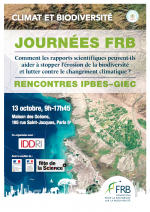The Intergovernmental Science-Policy Platform on Biodiversity and Ecosystem Services (IPBES) published its first assessments in February 2016, during the fourth session of its plena- ry held in Kuala Lumpur (Malaysia). IPBES is a historic opportunity to synthesize the knowledge on the causes, stemming from collective human action, underlying biodiversity loss. But to make a greater contribution to biodiversity and ecosystem protection policies, IPBES will need to strengthen the interdisciplinary nature of its assessments and thereby consolidate in its work linkages and synergies between environmental science and social science.
IDDRI has produced research and recommendations to improve the integration of knowledge on the underlying causes (known as “indirect factors”) of biodiversity loss in forthcoming IPBES research.
L'IPBES après Kuala Lumpur : la nécessaire évaluation des connaissances sur les causes sous-jacentes à l'érosion de la biodiversité (21852)

The institute coordinated this work in collaboration with other key actors from the sector in France, in particular the Fondation pour la Recherche sur la Biodiversité (FRB – Foundation for research on bio- diversity), through the co-organisation of the third IPCC-IPBES meeting in Paris (October 2016) and joint publications.
At the international level,the co-organisation of a workshop with the University of Cambridge (United Kingdom) in June was the opportunity to share IDDRI’s analyses with a group of leading researchers on IPBES, as well as with experts from the platform.
On the question of major threats to insect pollinators, a critical issue for biodiversity and a matter of real public concern, IDDRI has also published several columns in the French national press and online media.
These efforts have produced some tangible results:
- In February 2016, IDDRI’s recommendations, highlighting the importance of addressing inconsistencies between sectoral public policies were taken up by the French authorities and concluded the summary for decision makers of the report on pollination.
- Next, during the annual meeting in March 2017 in Bonn (Germany), IDDRI put forward a number of recommendations, including the addition of a chapter on “indirect factors” to the future IPBES assessment on the sustainable use of wild species. Sup- ported by the French delegation, this recommendation was accepted during the negotiations in Bonn.

